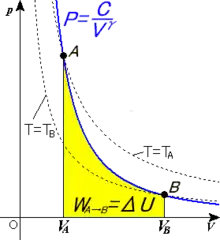adiabatic
See also: adiabàtic
English

A graph of pressure as a function of volume, for an adiabatic process
Etymology
19th-century coinage (introduced by W. J. M. Rankine in the 1860s) based on Ancient Greek ἀδιάβατος (adiábatos, “impassable”), used of terrain (rivers, forests) by Xenophon, from ἀ- (a-, “not”) + διά (diá, “through”) + βατός (batós, “passable”), from βαίνω (baínō, “to go”).
Pronunciation
- IPA(key): /ˌeɪdaɪəˈbætɪk/, /ˌeɪdɪəˈbætɪk/, /ˌædɪəˈbætɪk/
- Rhymes: -ætɪk
Adjective
adiabatic (not comparable)
- (physics, thermodynamics, of a process) That occurs without gain or loss of heat (and thus with no change in entropy, in the quasistatic approximation).
- 1871, J. C. Maxwell, Theory of Heat, p. 129:
- The line drawn on the indicator diagram in the latter case has been named by Professor Rankine an Adiabatic line, because it is defined by the condition that heat is not allowed to pass through (διαβαίνειν) the vessel which confines the substance.
- 2006, Thomas Pynchon, Against the Day, Vintage 2007, p. 737:
- Talk of dynamic compression and adiabatic gradients didn't carry as much weight as the certainty of its conscious intent.
- 1871, J. C. Maxwell, Theory of Heat, p. 129:
- (physics, quantum mechanics, of a process) That involves the slow change of the Hamiltonian of a system from its initial value to a final value.
Antonyms
- (thermodynamics): diabatic
- (quantum mechanics): nonadiabatic
Derived terms
Derived terms
Translations
occurring without gain or loss of heat
|
|
This article is issued from Wiktionary. The text is licensed under Creative Commons - Attribution - Sharealike. Additional terms may apply for the media files.